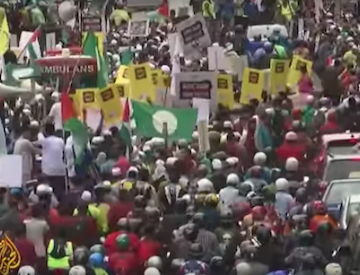Trump's decision to alter the position of the sacred sanctity of the Holy City of Jerusalem contravenes international law and only serves to fuel the fire of Palestinian-Israeli conflict, writes Dr Ibrahim Natil.
THE HOLY CITY OF JERUSALEM has been a core issue since the emergence of the Palestinian-Israeli conflict in the Middle East.
No one has attempted to change this status at the international arena in terms of international law.
U.S. President Trump’s recognition has already defied international law; however, UNESCO calls on the "occupying power" to end projects aimed at altering the 'character and status of the Holy City'. It has announced on two occasions this year that the Al-Aqsa Mosque and the old city of Jerusalem are Palestinian heritage sites.
Trump’s Jerusalem decision assists Israel to create facts on the ground as part of a plan to take full control of Jerusalem. This endorses Israeli actions, which are biblically driven and illegal. The Israeli Jews commemorate every year the occupation of Jerusalem after 3,000 years from the "control of strangers" according to their biblical doctrine. The Israeli occupation annexed Jerusalem and considers it as its own "eternal" capital, which is not recognised internationally and is considered an occupied city according to international law.
Trump's decision promotes only the Jewish narratives, and assists the Israelis to change the demographic and heritage structure of the city. Jerusalem, because of its location and the fact that it is a holy city, has had a significant role in the formation of national identity. East Jerusalem is where the famous and most sacred holy sites and shrines of both Muslims and Christians are located.
Palestinians are prevented from freely accessing Jerusalem from both the West Bank and the Gaza Strip. King Hashemite of Jordan also still plays a role in administrating the Al Haram Great Mosque despite the fact that the Israelis took over the old city from him in 1967. Jordan annexed it in 1948 as a part of the West Bank, after the Jewish Israeli forces defeated the Palestinian Arabs and occupied the western part of the Holy City.
France, Turkey and the UN and others, however, expressed dissatisfaction about Trump's unprecedented step of changing U.S foreign policy over a very crucial issue in the Palestine Israel conflict. Palestinian solidarity campaigns abroad and their supporters' calls from varied nations and races have organised marches around the world in rejection of this policy. This step negatively affects the image of U.S. foreign policy in the Middle East and Northern Africa. Trump’s advisers, however, have been trying to underline that the U.S. announcement had no bearing on final status negotiations.
The decision also encourages the Palestinian leadership to keep itself away from U.S. engagement in the peace process and fuels the conflict in the region.
Fuelling the Conflict
Palestinians in the occupied Palestinian Territories have challenged Trump's move. Palestinian protests also challenge the Israeli long-standing position that Jerusalem is unified under Israeli sovereignty. Jerusalem represents core values for Palestinian national identity. The religious sites of both Muslims and Christians in Jerusalem represent religious and national symbolism to all Palestinians, from all spectrums of life.
The local citizens of Jerusalem, for example, are spiritually and culturally connected to the Mosque. The Jerusalemites first ask each other every morning "How is the Mosque?" — not, "How is your family, your children or your business?" They have a very strong spiritual connection and loyalty to the Mosque, which takes precedence over their own national identity. The Palestinians' religious connection comes before their national one. Palestinian Christians share the same rights and "cause" with the Palestinian Muslims who seek to establish a viable Palestinian state. Palestinian Christians play a very important role in local politics and resistance.
The Palestinians revolt every time the Israelis attempt to test the level of their connection and loyalty to the Mosque. On 24 September 1996, there were reports that the Israeli antiquities authority were digging underneath the Mosque. This infuriated Palestinian youth who rushed onto the streets leading to violent confrontations between Palestinian Police and Israeli soldiers.
Jerusalem had also already escalated the bloody conflict "the second uprising" for four years from 2000 to 2004, between the Palestinians and Israelis when Ariel Sharon, a former Israeli prime minister, paid a visit to Aqsa on 28 September 2000. This caused thousands of deaths and the destruction of Palestinian infrastructure.
Trump's decision to recognise Jerusalem as a capital for Israel assists the Palestinian unification and resistance against the Israeli occupation and promotes the connection of Palestinians to their cause, which includes Jerusalem. It also negatively affects the global image of U.S. foreign policy in the Middle East and Northern Africa and encourages the Palestinian leadership to remove itself from U.S. engagement in the peace process.
Dr Ibrahim Natil is a Fellow at the Institute for International Conflict Resolution and Reconstruction at Dublin City University. He is a human rights campaigner and was a nominee for the Tällberg Foundation Global Leadership Prize, 2016.

This work is licensed under a Creative Commons Attribution-NonCommercial-NoDerivs 3.0 Australia License
Monthly Donation
Single Donation
Support fairness. Subscribe to IA.











